
Georges Benjamin Clemenceau was a French statesman who served as Prime Minister of France from 1906 to 1909 and again from 1917 until 1920. A physician turned journalist, he played a central role in the politics of the Third Republic, particularly amid the end of the First World War. He was a key figure of the Independent Radicals, advocating for the separation of church and state, as well as the amnesty of the Communards exiled to New Caledonia.
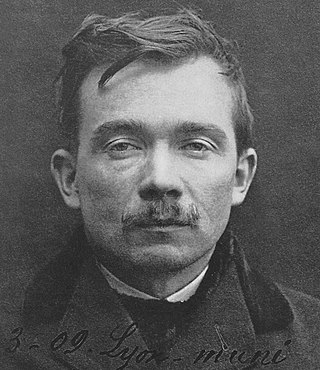
Jules Joseph Bonnot was a French soldier, anarchist, bank robber, and murderer. He is notorious for his role in the French anarchist band "The Bonnot Gang" that committed many crimes in early 20th century Paris, France.

The Bonnot Gang or The Tragic Bandits was a French criminal anarchist group that operated in France and Belgium during the late Belle Époque, from 1911 to 1912. Composed of individuals who identified with the emerging illegalist milieu, the gang used new technology, such as cars and repeating rifles not then available to the police.
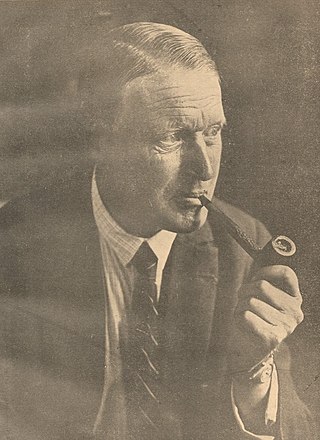
Rodolphe Archibald Reiss was a German–Swiss criminology-pioneer, forensic scientist, professor and writer.

A Search and Intervention Brigade, Investigation and Intervention Brigade or Anti-Gang Brigade) is a unit of the French National Police. The first units were formed in 1964 and carried out their tasks under the command of the Paris prefecture.

The Paris Police Prefecture, officially the Police Prefecture, is the unit of the French Ministry of the Interior that provides police, emergency services, and various administrative services to the population of the city of Paris and the surrounding three suburban départements of Hauts-de-Seine, Seine-Saint-Denis, and Val-de-Marne. It is headed by the Paris Prefect of Police, officially called the Prefect of Police.
Tigre, Tigres or El Tigre may refer to:

Vernon is a commune in the French department of Eure, administrative region of Normandy, northern France.
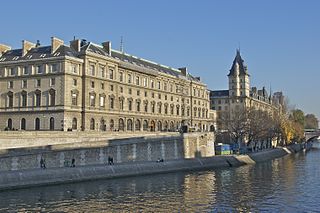
The Direction régionale de la police judiciaire de la préfecture de police de Paris, often called the 36 quai des Orfèvres or simply the 36 (trente-six) by the address of its headquarters, is the seat of the Paris regional division of the Central Directorate of the Judicial Police. Its 2,200 officers investigate about 15,000 crimes and offences a year.
The Deuxième Bureau de l'État-major général was France's external military intelligence agency from 1871 to 1940. It was dissolved together with the Third Republic upon the armistice with Germany. However the term "Deuxième Bureau", like "MI6" and "KGB", outlived the original organization as a general label for the country's intelligence service.

Philippe Clay, born Philippe Mathevet, was a French mime artist, singer and actor.

The place Louis-Lépine is a square in the 4th arrondissement of Paris on the île de la Cité. It is bounded by the rue de la Cité (east), rue de Lutèce (south), rue Aubé (west), the quai de la Corse (north), and is crossed by the allée Célestin-Hennion. It is named after Louis Lépine, a notable prefect of the Paris police. The Metro station Cité has its only entrance on the square. It is the venue for the Marché aux fleurs Reine-Elizabeth-II, a flower and bird market.

Célestin Hennion CVO was a French police officer who rose to head the Prefecture of Police. He was responsible for the reorganisation of the Préfecture and the introduction of The Tiger Brigades, ancestor of the French judicial police. In France, he is considered to be one of the pioneers of modern policing.

Louis Jean-Baptiste Lépine was a French lawyer, politician and administrator who was Governor General of Algeria and twice Préfet de Police with the Paris Police Prefecture from 1893 to 1897 and again from 1899 to 1913. On each occasion he assumed office during a period of instability in the governance of the French state seen by his supporters as a man who could bring order. He earned the nickname of "The Little Man with the Big Stick" for his methodology in handling large Parisian crowds. During his periods as Préfet de police he instigated a series of reforms that modernised the French Police Force. An efficient and clear-sighted administrator he introduced scientific analysis into policing with reforms in forensic science and the training of detectives. Lépine was also responsible for convening and re-invigorating the Exposition Universelle whereby an annual competition known as the Concours Lépine was introduced for inventors and innovators to have their work presented and acclaimed. An annual competition that has now had 120-plus editions.
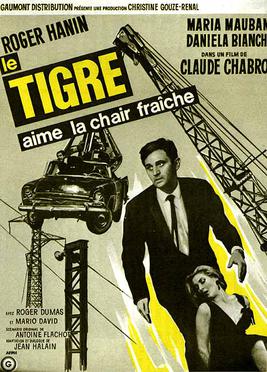
Le Tigre aime la chair fraîche, English title Code Name: Tiger, is a 1964 French Eurospy film directed by Claude Chabrol and starring Roger Hanin as the spy Louis Rapière, code named "The Tiger". The screenplay was written by Chabrol and Hanin. It was an attempt to create a French franchise equal to James Bond, and its female lead, Daniela Bianchi, had the previous year appeared in the James Bond film From Russia with Love. The film had a sequel in 1965, Le tigre se parfume à la dynamite.

The Central Directorate of the Judicial Police is a directorate of the National Police of France with national and territorial responsibility for investigating and fighting serious crime. It was formed in 1907 and subsequently restructured under an ordinance dated 5 August 2009.
René Ferté (1903–1958) was a Swiss actor who worked principally in the French cinema, from 1923 onwards. He is mostly known for performances in a series of silent films directed by Jean Epstein. His roles in sound films were generally less notable, though he appeared in Fritz Lang's Le Testament du docteur Mabuse, and he took the title role in the 1934 sound remake of Judex. After the outbreak of the Second World War he ceased working in films.

Valentin Valentin is a 2015 French crime mystery film directed by Pascal Thomas and starring Marilou Berry, Vincent Rottiers and Marie Gillain.
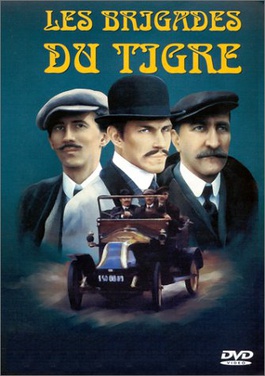
The Tiger Brigades is a period crime television series which originally ran between 1974 and 1983. Created by Claude Desailly, it follows the activities of a police squad in the early twentieth century.
Paris Police 1900 is a French crime drama television series created by Fabien Nury that was first broadcast on 8 February 2021 on Canal+ in France and was shown on BBC Four in October 2021. A follow-up series of six episodes, featuring the same characters and called Paris Police 1905, was released in 2022.
















